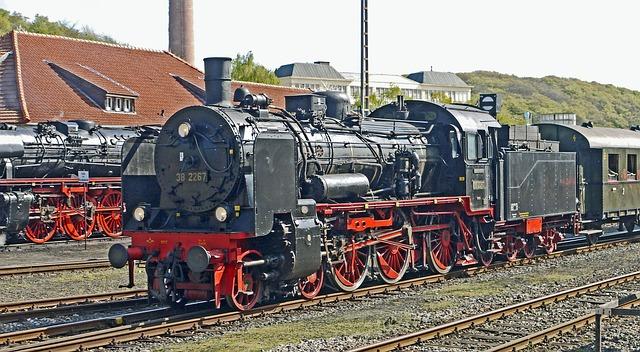In a important advancement for Brazil’s infrastructure landscape, VINCI has secured the concession for the BR-040 highway, a critical artery connecting Belo Horizonte, the capital of Minas Gerais, to Cristalina in Goiás. This strategic win not only highlights VINCI’s expanding footprint in Latin America but also underscores the vital role public-private partnerships play in enhancing transportation networks across the region. The BR-040 highway is a key route for both commercial and passenger traffic, facilitating economic activity and connectivity between major urban centers. As part of the concession agreement, VINCI is poised to invest in extensive upgrades and maintenance, promising improvements in safety, efficiency, and overall driving experience for users. This article delves into the implications of this concession for Brazil’s infrastructure development, the anticipated benefits for local communities, and VINCI’s broader vision for sustainable transportation solutions in the country.
VINCI’s Strategic Acquisition of the BR-040 Highway Concession in Brazil
The recent acquisition of the BR-040 highway concession by VINCI represents a significant milestone in the company’s growth strategy in Brazil. This strategic investment consolidates VINCI’s commitment to enhancing infrastructure within the country while ensuring improved connectivity between major urban centers. The BR-040 highway, a crucial link between Belo Horizonte and Cristalina, will benefit from upgraded facilities and maintenance aimed at facilitating smoother traffic flow and increasing safety for all users.
As part of its operational objectives, VINCI plans to implement a variety of enhancements along the route, including:
- Infrastructure upgrades: Widening lanes and improving road surface quality.
- Toll management: Implementing advanced electronic toll collection systems.
- Safety measures: Increasing the number of rest areas and emergency response stations.
- Environmental initiatives: Employing sustainable practices in road maintenance.
This concession aligns wiht VINCI’s broader vision of fostering sustainable transport solutions while supporting Brazil’s economic development. The company’s experience in managing large-scale infrastructure projects equips it well to navigate the complexities associated with this expansive highway network.

Implications of the Belo Horizonte to Cristalina Route for Regional Connectivity
The recent concession of the BR-040 highway between Belo Horizonte and Cristalina by VINCI is set to greatly enhance regional connectivity, fostering economic growth and development across the area. Improved infrastructure will facilitate smoother transportation of goods and people,considerably reducing travel time and increasing efficiency. Key benefits include:
- Enhanced Trade Opportunities: Local businesses will benefit from easier access to larger markets.
- Increased Tourism: A more accessible route will encourage more visitors to explore the region’s attractions.
- Job Creation: The construction and maintenance of the highway are expected to generate numerous employment opportunities.
Moreover, the strategic location of the BR-040 serves as a vital link between key urban centers, promoting not just local, but also regional and national integration. The ease of connectivity will have ripple effects on several sectors, including:
| Sector | Impact |
|---|---|
| Logistics | Reduction in transport costs and improved delivery times. |
| agriculture | Better access to markets for farmers, leading to higher profitability. |
| Manufacturing | Streamlined supply chains enabling smoother operations. |

Economic Impact Assessment of the New Concession on Local communities
The recent concession awarded to VINCI for the BR-040 highway is expected to significantly influence the local economy surrounding the Belo Horizonte to cristalina route. As the project commences,there are several potential economic benefits for the communities along the highway,including:
- Job Creation: The construction and ongoing maintenance of the highway are anticipated to generate numerous job opportunities for local residents.
- Increased Local Business Revenue: Enhanced transportation infrastructure can lead to greater accessibility, boosting sales for local businesses and attracting new enterprises.
- Improved Access to Services: Better connectivity is likely to facilitate easier access to essential services such as healthcare and education, thereby improving quality of life.
Moreover, VINCI’s plans for community engagement and investment can further solidify its positive impact. This includes potential partnerships with local stakeholders to ensure that development projects align with community needs. To provide a clear overview of anticipated financial inflows, the table below illustrates projected economic contributions over the concession period:
| year | Projected Investment (BRL) | Estimated Jobs Created |
|---|---|---|
| 2024 | 50,000,000 | 500 |
| 2025 | 75,000,000 | 750 |
| 2026 | 100,000,000 | 1,000 |
This strategic investment not only lays the groundwork for immediate economic growth but also fosters long-term sustainability for the local communities in the region.

Sustainability Initiatives: VINCI’s Commitment to Environmentally Friendly Practices
As part of its expanding operations in Brazil, VINCI is committed to integrating sustainable development principles into its projects. The BR-040 highway concession presents an prospect to implement innovative environmental practices. This includes the use of eco-friendly materials in construction, promotion of biodiversity through habitat preservation along the highway corridor, and adherence to strict local and international environmental standards. The key initiatives will encompass:
- Carbon Footprint Reduction: Strategic planning to minimize emissions during construction and operation.
- Water Management: Implementing systems to reduce water consumption and ensure runoff management.
- Sustainable Procurement: Sourcing materials from responsible suppliers committed to environmental stewardship.
Furthermore, VINCI is dedicated to engaging local communities in sustainability efforts.Public awareness campaigns and stakeholder consultations will enhance community involvement and foster a sense of ownership in environmental initiatives. A summary of the planned community engagement programs includes:
| Program | Description | Timeline |
|---|---|---|
| Educational Workshops | Workshops aimed at raising awareness about sustainability and environmental protection. | Quarterly |
| Community Clean-Up Days | organized events for local residents to promote clean habitats along the highway. | Biannually |
| Feedback Forums | Meetings to gather community feedback and improve project sustainability practices. | Monthly |

Investing in Infrastructure: Future Prospects for the BR-040 Project
The BR-040 project is set to revolutionize the transportation landscape between Belo Horizonte and Cristalina,representing a significant opportunity for both economic growth and infrastructure enhancement in Brazil. With VINCI at the helm, the project promises to bolster connectivity, reduce travel times, and improve safety on one of the nation’s critical arteries. Key benefits of the BR-040 project include:
- Enhanced logistics for businesses operating in the region.
- Increased accessibility to economic hubs.
- Creation of job opportunities during and post-construction.
- improvement in road safety features and technology.
Looking ahead,the BR-040 project will serve as a model for future infrastructure investments across the country. As Brazil grapples with the challenges of aging infrastructure and increasing transportation demands, prosperous completion of this project could catalyze further projects aimed at modernization. Stakeholders will be closely monitoring the project’s progress for potential impacts such as:
| Impact | Expected Outcome |
|---|---|
| Economic Growth | Increased GDP contributions from improved trade routes |
| Environmental Considerations | Implementation of sustainable construction practices |
| Community Development | Improved local services and infrastructure |
Recommendations for Stakeholder Engagement in the Highway development Process
Stakeholder engagement is a critical aspect of any infrastructure project, especially in the context of highway development. To ensure successful outcomes during the BR-040 highway project, it is essential to adopt a multifaceted approach that respects the diverse interests of the community, government authorities, and environmental groups. Key recommendations include:
- Early Involvement: Engage stakeholders from the very beginning to gather insights and foster trust.
- Transparent Interaction: Maintain open lines of communication to keep stakeholders informed of progress and changes.
- Feedback Mechanisms: Establish channels for stakeholders to voice their concerns and suggestions, ensuring their input is genuinely considered.
- Collaboration with Local Communities: Work closely with local populations to identify their needs and expectations from the project.
- Regular Updates: Provide consistent updates throughout the process to enhance transparency and accountability.
Furthermore, integrating public consultation processes can significantly enhance the legitimacy of the project and increase community support. Forming advisory panels that include representatives from various stakeholder groups can provide a balanced viewpoint on project impacts. Below is a table summarizing potential stakeholder categories and their engagement strategies:
| Stakeholder Category | Engagement Strategy |
|---|---|
| Local Communities | Public forums and workshops |
| Government Authorities | Regular meetings and reporting |
| Environmental Groups | Collaborative impact assessments |
| Investors | Detailed project updates and financial reviews |
Closing Remarks
VINCI’s successful acquisition of the BR-040 highway concession marks a significant development in Brazil’s infrastructure landscape. This highway, which connects the major cities of Belo Horizonte and Cristalina, has long been a vital artery for transportation and commerce in the region. With VINCI’s track record of sustainable and efficient project execution, stakeholders can look forward to improved road conditions, enhanced traffic flow, and increased safety for travelers.
The concession not only promises to elevate the standards of highway maintenance and operations but also presents opportunities for economic growth and job creation in the surrounding communities. As VINCI embarks on this ambitious project, it will be crucial to monitor the outcomes and impact on both local and national levels.
With infrastructure investments playing a pivotal role in Brazil’s economic recovery and development strategies, VINCI’s leadership in this concession could set a precedent for future public-private partnerships. As the project unfolds, all eyes will be on VINCI to deliver on its commitments and contribute positively to Brazil’s transportation network.







![[Expired] [Award Alert] U.S. Cities to São Paulo, Brazil From 50K Miles in Business Class – Upgraded Points](https://capital-cities.info/wp-content/uploads/2025/07/149760-expired-award-alert-us-cities-to-sao-paulo-brazil-from-50k-miles-in-business-class-upgraded-points-360x180.jpg)







